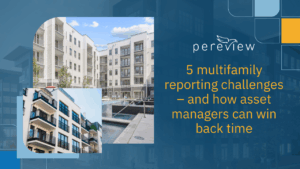In the highly competitive real estate asset management field, technology is a must-have for managing data, reporting, and much more. Choosing the right technology for your company is not just an operational decision but also a strategic one. The right software solution can drive efficiency, enhance decision-making, and provide you with a competitive edge.
But how do you determine what solution is best for your company? Below you’ll find seven key questions that will guide your evaluation process and help you navigate the intricate process of selecting the right software solution for your firm.
1. Does it improve your existing business processes?
Any technology you choose has to improve the way your company does business. Otherwise, there’s no sense in investing in it. For example, how easily can your employees perform the necessary analysis and create the reports that are going to drive your business forward? If they have to hunt down the data they need and spend countless hours compiling it and generating reports, that’s not very efficient.
As a result, you’ll want to find a solution that can solve those challenges and help them be more effective in their roles. This, in turn, will help you make better business decisions that will ultimately lead to success in your investments.
2. Does it meet your company’s needs?
Whether you’re looking to optimize your asset management, improve client relationships, enhance portfolio analysis, or something completely different, understanding what you want to achieve will guide your search for the right solution.
Break down your company’s needs and goals into specific requirements that cover functionality, integration, user-friendliness, scalability, customization, and more. This will be instrumental in helping you evaluate your options.
3. What are its integration capabilities?
Whatever new solution you choose to invest in should seamlessly integrate with your existing systems. Not only that, but it should also enable integration between any of these systems that may be siloed. When assessing how potential solutions will work with your current technologies and workflows, make sure the new addition will enhance rather than disrupt your existing processes.
4. How secure is the solution?
In an industry where sensitive financial data is handled daily, security and regulatory compliance are paramount. Examine the security protocols, encryption standards, and compliance certifications of potential software to ensure that they meet industry and legal standards.
5. Will it work today and in the future?
As with anything, one of the few constants in real estate is change. Markets fluctuate, investment strategies evolve, and new technologies arrive in the market all the time. Choose a solution that can adapt to changes in your business size, portfolio complexity, or market focus. A scalable solution ensures that your investment in technology remains relevant and supportive as your firm grows or pivots.
6. How customizable and user-friendly is it?
It’s rare that any solution will offer all the features and functionality your company wants or needs right out of the box. No two companies have the same needs and workflows, so whatever solution you choose should be tailored to your firm’s unique requirements. You might be surprised at the varying levels of customization – ranging from none to “the sky’s the limit” – there are out there.
It’s equally important to ensure that the new solution is user-friendly to allow your team to adopt it with a minimum amount of training. This is also crucial following implementation because if the system is difficult to use, employees will revert to their old, inefficient processes.
7. What is the provider’s reputation in the market?
For any purchase, you should investigate the vendor’s reputation and look at their track record with other real estate investment firms. Strong customer support, continuous updates, customization, and a clear roadmap for future development are signs of a well-respected provider.
Most providers will happily provide you with a reference from their current customer base who can share their experience with the solution, from implementation through deployment and beyond.
Conclusion
Choosing technology for your firm is a significant decision that requires a meticulous and strategic approach. By aligning the software selection with your business processes and needs, and assessing these seven questions, you can build a strong foundation for making the right choice.
Remember, technology is not just a tool; it’s an enabler for growth and success in real estate asset management. Putting in time and effort into choosing wisely is not only about getting the best solution but also about positioning your firm for long-term success in a highly competitive market. The right decision here becomes a strategic asset that propels your firm toward achieving its vision and mission.



